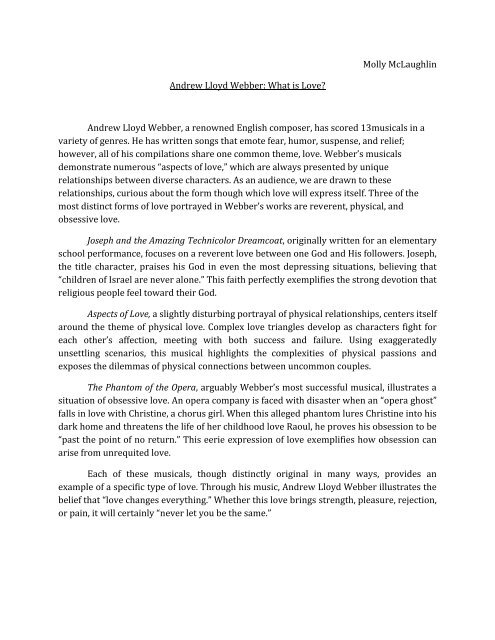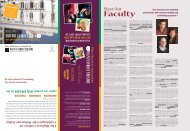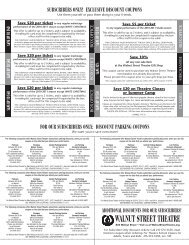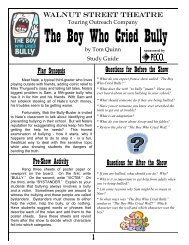Seeing the Stage Through Our Eyes - Walnut Street Theatre
Seeing the Stage Through Our Eyes - Walnut Street Theatre
Seeing the Stage Through Our Eyes - Walnut Street Theatre
You also want an ePaper? Increase the reach of your titles
YUMPU automatically turns print PDFs into web optimized ePapers that Google loves.
Molly McLaughlin<br />
Andrew Lloyd Webber: What is Love<br />
Andrew Lloyd Webber, a renowned English composer, has scored 13musicals in a<br />
variety of genres. He has written songs that emote fear, humor, suspense, and relief;<br />
however, all of his compilations share one common <strong>the</strong>me, love. Webber’s musicals<br />
demonstrate numerous “aspects of love,” which are always presented by unique<br />
relationships between diverse characters. As an audience, we are drawn to <strong>the</strong>se<br />
relationships, curious about <strong>the</strong> form though which love will express itself. Three of <strong>the</strong><br />
most distinct forms of love portrayed in Webber’s works are reverent, physical, and<br />
obsessive love.<br />
Joseph and <strong>the</strong> Amazing Technicolor Dreamcoat, originally written for an elementary<br />
school performance, focuses on a reverent love between one God and His followers. Joseph,<br />
<strong>the</strong> title character, praises his God in even <strong>the</strong> most depressing situations, believing that<br />
“children of Israel are never alone.” This faith perfectly exemplifies <strong>the</strong> strong devotion that<br />
religious people feel toward <strong>the</strong>ir God.<br />
Aspects of Love, a slightly disturbing portrayal of physical relationships, centers itself<br />
around <strong>the</strong> <strong>the</strong>me of physical love. Complex love triangles develop as characters fight for<br />
each o<strong>the</strong>r’s affection, meeting with both success and failure. Using exaggeratedly<br />
unsettling scenarios, this musical highlights <strong>the</strong> complexities of physical passions and<br />
exposes <strong>the</strong> dilemmas of physical connections between uncommon couples.<br />
The Phantom of <strong>the</strong> Opera, arguably Webber’s most successful musical, illustrates a<br />
situation of obsessive love. An opera company is faced with disaster when an “opera ghost”<br />
falls in love with Christine, a chorus girl. When this alleged phantom lures Christine into his<br />
dark home and threatens <strong>the</strong> life of her childhood love Raoul, he proves his obsession to be<br />
“past <strong>the</strong> point of no return.” This eerie expression of love exemplifies how obsession can<br />
arise from unrequited love.<br />
Each of <strong>the</strong>se musicals, though distinctly original in many ways, provides an<br />
example of a specific type of love. <strong>Through</strong> his music, Andrew Lloyd Webber illustrates <strong>the</strong><br />
belief that “love changes everything.” Whe<strong>the</strong>r this love brings strength, pleasure, rejection,<br />
or pain, it will certainly “never let you be <strong>the</strong> same.”
















